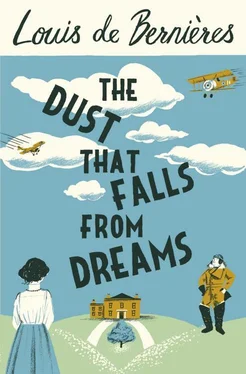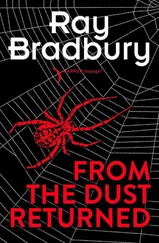DEAR LORD, THANK you, Lord, for sparing Ash’s life and letting him only be wounded so that he can come home with honour but safe.
Thank you, Lord, for making our future possible, for sparing us any more the pain of separation, and thank you for taking away the terrible fear that’s been my torment ever since he went, and thank you for this relief.
And I promise, Lord, that when he comes back I will be as good a Christian wife as it is possible to be, and I promise I shall care for him and tend to him and do all I can to make him happy, and I promise I shall strive to bring him closer to you by my own example and persuasion, and when we have children I promise I’ll bring them up in the light of your countenance so that you will be their guide and comforter, and please let him recover soon and bring him back to me because without him I am nothing, Lord, and you know how desperate I’ve been.
26. Naught Broken Save this Body (2)
IT WAS ASH’S mother at the door, trembling, unable to speak or to control the muscles in her face. Mrs Pendennis had a piece of brown paper in her hand, folded in half. Millicent let her in, sat her down in the drawing room, and went to call Rosie, as if she knew by instinct what to do.
Rosie came running down the stairs and into the room. She liked to call Ash’s mother ‘Mamma’ because she had spent so much of her childhood at the Pendennis house. Mrs Pendennis was seated by the window, fumbling in her handbag. She looked up, and silently passed the sheet of brown paper to Rosie.
Rosie took the telegram and read it several times. Her hands began to shake. She let out a small cry of agony and then stood quite still as the tears began to cascade down her cheeks. Then she put her hands to the side of her head and began to wail, her grief filling the far corners of that large, emptied house.
Ash’s mother drew her down to the sofa and they clutched each other. Millicent came in, left them a tray of tea and biscuits, bobbed and went out. She returned to the kitchen, locked herself in the larder and began to sob. Cookie knocked on the door and demanded to know what was going on. Millicent unlocked it and just managed to relay the news before breaking down again. Cookie put her arms around her and they cried together, just like the women upstairs.
On the sofa, mother and fiancée embraced so tightly that they resembled a strange many-limbed creature. They locked together, rocking and sobbing, their world shrinking, contracting, distorting.
‘It’s all my fault,’ sobbed Rosie at last. ‘It’s all my fault. Oh God, oh God! It was me, oh God, it was me!’
Mrs Pendennis said, ‘How could it be you?’
‘I … I didn’t pray for him … the night before he was wounded … I was so tired … I thought, “Just once it won’t matter” …’
‘Oh, Rosie,’ said Mrs Pendennis, ‘don’t, please don’t. Do you think that I wasn’t praying?’
27. Rosie in St John’s (2)
HOW HAVE WE displeased you? What have we done? How can I live?
What am I supposed to do? What can I possibly do, now that he’s gone?
Take me too. Let me die too. Please, Lord, take me too.
You’ve shut me out of the light. I’m in the dark, like one who has no eyes. All the days of my life, darkness and darkness and nothing but night.
O Lord, I can’t get up, my cheek’s on the freezing stone, and the tears won’t stop, and I’m aching all over from weeping and Mrs Ottway and the priest and the other ladies are trying to raise me.
28. Safe Though All Safety’s Lost
1
My dear Rosie,
I really don’t know quite how to write to you about poor Ash’s death, but first of all let me assure you that he died in no pain and that everything was done to save him. It happened just one week ago today during a bombardment, when a shell burst above the parapet and some balls of shrapnel struck him on the soft part of the hip and entered the stomach. I was just behind him and waited with him whilst the stretcher was brought. The details are awful, but as you loved him and he you, it is better that you know it all. We got him down to the dressing station. He was conscious most of the time and was quite cheerful. He never complained. He was sent at once to Bailleul Hospital where he was taken great care of. He died at 9.20 on Friday the 19th. I would have written before and would have gone with him but we were in the firing line and were not allowed to write or get leave even in such an extreme case. I was too late when I was released on the night of his death and did not get to Bailleul Hospital in any case because I could not walk owing to an ankle injury.
We buried him yesterday, Saturday the 20th, in Bailleul churchyard and on his wooden cross (which I will replace as soon as I can) is written ‘Private A. Pendennis, died from wounds received in action 14 February 1915’. He was buried with full military honours and was carried by Ronald Heddewick, Leonard Hutchinson, Edward Burman and myself. The Reverend Captain Fairhead held the service.
Rosie, you can’t imagine how sorry I am for you, but you must understand as he was my brother how I must feel, not only for myself and Sidney, but for my poor mother and father. In all your sorrow spare some sorrow for us. May God give us strength to bear all this. I have many of your letters to him. Shall I destroy them or send them back to you? If there is anything I can do for you out here, do not hesitate to ask me.
You have my heartfelt sympathy as you must know, and may God protect us so that if we meet again I can tell you every little incident of our life here.
Yours very sincerely, your old pal,
Albert P.
PS I saw Sidney yesterday and he is devastated of course, but he sends his fondest sympathy to you.
Passed by no. 1900 censor
2
No. 8 Clearing Hospital
British Expeditionary Force
France
27 February 1915
Dear Mr Pendennis,
Your letter arrived yesterday. No doubt your son’s letter has reached you by now, giving details of Ashbridge’s passing away. I meant to have written to you myself but after we had laid him to rest your other boy seemed anxious to tell you what there was to tell, so I left him to do it. Since, however, you have written, I can only repeat what probably the others have already told you. Ashbridge seemed to be doing really well for some days until the evening before his passing. Then he was restless, but the doctor overcame that and the next morning he seemed to be doing well again. It was only a few hours before he died that his condition caused any alarm, and even then the doctor hoped it was merely one of the bad times through which most of the wounded cases have to pass. But he became worse and I went to him. Though he was unable to talk much he was conscious. You were all very much in his thoughts and he sent you his dearest love and also to his fiancée. He said that he was perfectly happy. I pronounced the absolution over him and said prayers with him while he held my crucifix in his hand. I left him and later went to see him again. He was unconscious, and I commended him to the love and mercy of Our Father and gave him the Blessing. Shortly afterwards he passed with the most peaceful expression on his face. May I say, in all sympathy and love, that of all those who have passed through the veil since I have been here, not one has passed into Paradise leaving behind in our hearts the certainty of that future life more fully and realistically than was the case with your dear boy. With all conviction we can say that he has passed into God’s peace. Your son Albert came to see me in the morning and we arranged for the funeral to take place on Saturday afternoon so that he and some friends and an officer could attend. It was all most touching, and your boy was tremendously brave. In case you would like the particulars, the number of the grave is 331. On his grave there stands a plain wooden cross on which is inscribed his name, regiment and number, and also ‘died from wounds received in action’. Nothing nobler could be said of any soldier, especially a civilian soldier, at a time like this. He has died nobly for God, for Country, for King, and you will bear your loss as I know he would have had you bear it, nobly too. And so we leave him ’til the Great Day. He will often be with you, closer than he has ever been before. I can sympathise with you so fully, dear friend. Only a week before you lost your son I was home on leave, and the evening before I returned to the front, my youngest and favourite sister (twenty-one years) passed away on account of a Zeppelin raid, and so it is with my heart full of sympathy that I ministered to him and have prayed for you and his dearest ones. But, thank God, our Christian Truth is a glorious thing. Your dear ones often come to cheer us and tell us of their present great joy and we are wrong to wish to rob them of that.
Читать дальше












